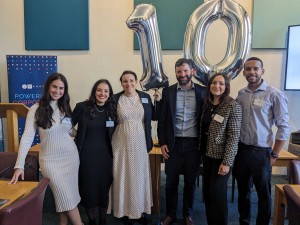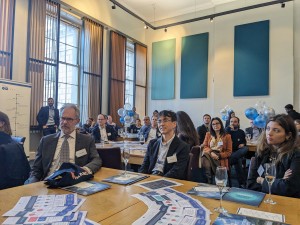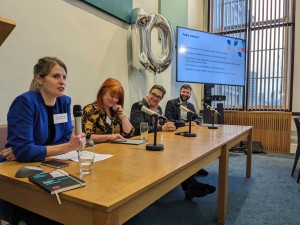London, United Kingdom Nov 9, 2023 (Issuewire.com) - King’s Business School co-hosted the event "Celebrating 10 Years of Fuelling Corporate Innovation" in collaboration with L Marks and the LSE Financial Markets Group (FMG). The event showcased the preliminary findings on the impact of open innovation labs.
Together with fifty of L Marks’ partners, L Marks celebrated this special milestone of ten years dedicated to nurturing innovation across a diverse array of companies. The event featured insights from Stuart Marks, the chairman and founder of L Marks, who recounted the journey of the firm's establishment and highlighted some of its most noteworthy achievements during its first decade.
During the event, Dr Juanita Gonzalez-Uribe, Associate Professor of Finance at the London School of Economics, shared preliminary findings from an ongoing study that assesses the impact of open innovation labs on a broader spectrum of participants. The study goes beyond a mere examination of the success of selected startups; but delves into how participation, starting from the application phase, adds value to companies.
Dr. Gonzalez-Uribe’s presentation began by acknowledging the immense potential of open innovation, emphasising its ability to drive rapid technological advancement, mitigate risks, and expedite go-to-market strategies. However, she also pointed out potential pitfalls, such as the risk of succumbing to what Steve Blank terms "innovation theatre”, talent poaching, and idea appropriation. L Marks CEO, Daniel Saunders, underscored the company's unwavering commitment to avoiding "innovation safaris" and "innovation tourism", focusing on innovation that yields tangible outcomes.
While comprehensive results are still pending, initial findings suggest that open innovation labs operated by two of L Marks' partners, United Utilities and Wincanton, have delivered additional benefits, including increased employee numbers and improved fundraising post-lab participation. Furthermore, the study indicated positive outcomes regarding the broader impact of the programme; with participants in pitch days, even if they do not secure a position in the programme, are more likely to become suppliers and build larger teams compared to applicants who don't advance to the pitch day stage.
Subsequently, a panel discussion featuring Dr Robyn Klingler-Vidra, Associate Dean at King’s Business School, Kieran Brocklebank, Head of Innovation at United Utilities, Claire Charlton, Head of Wincanton's W2 Innovation Programme, and Daniel Saunders, CEO of L Marks, delved into the implications of these results for participating firms.
- The value of injecting innovation into organisational culture: The panel highlighted the pivotal role of innovation labs in shaping a company's culture. For instance, Claire spoke about what Wincanton, through their W2 programme, has done to establish W2 as a brand of innovation, fostering an identity for Wincanton employees to align with. It's about, as she says, “the sizzle and the sausage” It's the energy, the buzz, and the brand, but also the real thing (the sausage). Innovation labs have transitioned from marketing initiatives to operational solutions, resulting in the creation of dedicated C-level innovation positions and innovation programme leadership roles. The focus is on practical problem-solving rather than mere aesthetics, involving numerous team members in various capacities.
- The need to adapt to different innovation imperatives: The panel acknowledged that innovation labs provide unique value but also encounter distinct challenges due to a company's specific circumstances. The ability to rapidly innovate might not be feasible in highly regulated sectors or industries dependent on stringent public procurement processes. Different industry dynamics, regulations, and ownership structures influence the nature of open innovation labs.
- Innovation is about being humble: As Daniel Saunders emphasised, innovation requires humility; it entails acknowledging the limits of in-house expertise and the necessity of seeking external insights. Innovation involves constant learning, testing, and embracing risk, rather than solely focusing on perfecting technology without validating its real-world applications.
Bringing together L Marks’ partners from across the years and evidencing the value of open innovation through the partnership with King’s Business School and the London School of Economics, was a great way to celebrate a decade of progress and growth. It also provided an opportunity to reflect on the knowledge gained, their expansion into the US market, and the evolution of their services to include intrapreneurship, a venture studio, and, more recently, strategic innovation, effectively meeting the evolving needs of corporations.
With the research from King’s Business School and the London School of Economics still ongoing, the full results from the impact assessment will be released in early 2024. Looking ahead to the next ten years and beyond, L Marks remains committed to fostering innovation across industries and geographies, driving an innovative culture, delivering value to its corporate partners, and shaping the future of business.
Media Contact
L Marks chamsa@lmarks.com https://lmarks.com/











